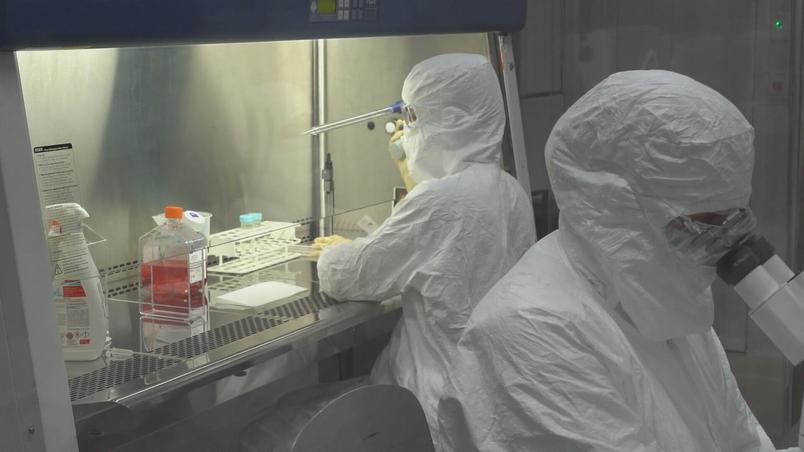RIO DE JANEIRO, BRAZIL – A new Covid-19 vaccine candidate is being developed by Argentine and Brazilian researchers, searching for a vaccine focused on the new virus variants, such as the P.1, which is present in both countries.

The vaccine, developed in partnership with American biotech Vaxinz, showed positive results in tests with mice, pointing to the production of specific antibodies and immune system response against the novel coronavirus. The goal is to meet the demand for vaccines in Latin America, which still relies on raw materials and alternatives from other continents.
The project began with research by scientists from the National Council for Scientific and Technical Research (CONICET), at the Leloir Institute Foundation (FIL), in Buenos Aires, and uses non-replicating adenovirus technology, like the Oxford/AstraZeneca, Johnson & Johnson, and Sputnik V vaccines.
In Brazil, the research relies on the participation of scientists from the Federal University of São Paulo’s School of Medicine (EPM/Unifesp). The institution has experience with Covid-19 vaccines, given its work in coordinating the Oxford vaccine trials in Brazil.
“We are trying to achieve a vaccine that covers the predominant variants in the region because the P.1 and UK variants are now in Argentina, and that can be administered with a single dose or in a complementary dose, for those who have already been vaccinated, to protect against variants that are not prevalent in the region,” explains project coordinator Osvaldo Podhajcer, head of the Laboratory of Molecular and Cellular Therapy (LTMC) at FIL and senior researcher at CONICET.
Julián Maggini, Vaxinz’s medical director, says the goal is to have a potent and preferably single-dose vaccine. “For a large state, a country, it is difficult to organize vaccination. A single dose is very important for our countries. Our countries impact the world and we are seeing an increase in cases that should be of concern.”
According to Podhajcer, the second-generation vaccine uses a genetically modified adenovirus that makes it more potent and virus-specific and has been shown to keep mice protected for at least 5 months. It has proven effective in 100% of vaccinated animals. The group he coordinates also developed a pseudovirus system that was able to demonstrate, in in vitro studies, that serum from immunized animals blocks the entry of the novel coronavirus into cells.
Phase 2 and 3 trials are expected to be conducted by EPM/Unifesp at the São Paulo Hospital, linked to the university. “One of the great motivations was to build technology and production capacity that would meet our needs, the needs of Latin America because we are very dependent not only on other countries but on other continents.
We have completed a portion of this pre-clinical part, observing viral neutralization, when one wants to test whether it (the vaccine) inhibits the virus or not. Phase 1 will not be conducted in the country, but we have agreed to be the coordinating center in Brazil for phase 2 and phase 3 trials, as soon as we have the required authorizations,” says Manoel Girão, Unifesp’s School of Medicine director.
The goal is to conduct clinical trials still this year so that if its safety and efficacy are proven, it will act as another front in the fight against the virus. According to Girão, “it is difficult to set a deadline, but we intend to start at the beginning of the second semester. One of the main lessons that the virus is teaching us is the strong perception that either we all emerge from this together or no one will. This will create solidarity because the virus will keep mutating and coming back to haunt us. It is no use vaccinating the whole of Europe and leaving Africa behind, and it will not be a vaccine alone that will solve the problem. The virus is not stationary, it is unstable, it mutates, technological development must continue.”
Adaptation to new variants
One of the advantages of the technology used in the vaccine under study is its ability to adapt according to the emergence of new variants, says Juliana Maricato, professor of the Department of Microbiology, Immunology, and Parasitology at EPM/Unifesp.
“This new technology is the construction of the adenoviral vector, which has proven to be more efficient than others and is very flexible to include sequences of new variants in a short period of time. It can also represent an alternative for countries like India and South Africa. At the moment we are taking these variants into account, with international relations; we receive immigrants and visitors, so blocking new variants is important.”
Laboratory tests have shown the vaccine candidate’s ability to act against the P.1 variant. “Samples were sent here and we tested its ability to neutralize against live, natural viruses, which we isolated from the first patients in 2020 and January 2021, with the P.1 variant. We found that this serum was capable of neutralizing the virus.”

